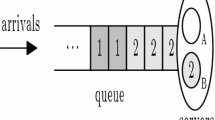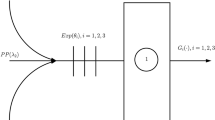Abstract
In this paper, we study a discrete-time queueing system with one server and two classes of customers. Customers enter the system according to a general independent arrival process. The classes of consecutive customers, however, are correlated in a Markovian way. The system uses a “global FCFS” service discipline, i.e., all arriving customers are accommodated in one single FCFS queue, regardless of their classes. The service-time distribution of the customers is general but class-dependent, and therefore, the exact order in which the customers of both classes succeed each other in the arrival stream is important, which is reflected by the complexity of the system content and waiting time analysis presented in this paper. In particular, a detailed waiting time analysis of this kind of multi-class system has not yet been published, and is considered to be one of the main novelties by the authors. In addition to that, a major aim of the paper is to estimate the impact of interclass correlation in the arrival stream on the total number of customers in the system, and the customer delay. The results reveal that the system can exhibit two different classes of stochastic equilibrium: a “strong” equilibrium where both customer classes give rise to stable behavior individually, and a “compensated” equilibrium where one customer type creates overload.












Similar content being viewed by others
Notes
Notice the analogy with complex numbers calculus: for \(z=x+\imath y\) with \(x,y\in \mathbb {R}\), then \(f(z)+f(z^*)\in \mathbb {R}\), since this is an even function of \(\imath y\)
References
Adan I, Kulkarni V (2003) Single-server queue with markov dependent inter-arrival and service times. Queueing Syst 45(2):113–134
Adan I, Sleptchenko A, Van Houtum G (2009) Reducing costs of spare parts supply systems via static priorities. Asia Pac J Oper Res 26(4):559–585
Asmussen S (2002) Applied probability and queues. Springer, New York
Banik A, Chaudhry M, Gupta U (2008) On the finite buffer queue with renewal input and batch markovian service process: GI/BMSP/1/N. Methodol Comput Appl Probab 10:559–575
Boxma O, Bruin J, Fralix B (2009) Sojourn times in polling systems with various service disciplines. Perform Eval 66(11):621–639
Bruneel H (1988) Queuing behavior of statistical multiplexers with correlated inputs. IEEE Trans Commun 36(12):1339–1341
Bruneel H (1993) Performance of discrete-time queuing-systems. Comput Oper Res 20(3):303–320
Bruneel H, Kim B (1993) Discrete-time models for communication systems including ATM. Kluwer Academic, Boston
Bruneel H, Maertens T, Steyaert B, Claeys D, Fiems D, Walraevens J (2012a) Analysis of a two-class FCFS queueing system with interclass correlation. In: Proceedings of the 19th international conference on analytical and stochastic modelling techniques and applications (ASMTA’12), Grenoble, June 4–6
Bruneel H, Mélange W, Steyaert B, Claeys D, Walraevens J (2012b) Impact of blocking when customers of different classes are accommodated in one common queue. In: Proceedings of the 1st international conference on operations research and enterprise systems (ICORES), Villamoura, Portugal
Bruneel H, Mélange W, Steyaert B, Claeys D, Walraevens J (2012c) A two-class discrete-time queueing model with two dedicated servers and global FCFS service discipline. Eur J Oper Res 223:123–132
Bruneel H, Maertens T, Walraevens J (2013) Interclass correlation in priority scheduling: an overlooked phenomenon. In: Proceedings of the eighth international conference on queueing theory and network applications (QTNA 2013), Taichung, Taiwan
Bruneel H, Maertens T, Walraevens J (2014) Class clustering destroys delay differentiation in priority queues. Eur J Oper Res 235(1):149–158
Chrysos N, Katevenis M (2011) Distributed WFQ scheduling converging to weighted max–min fairness. Comput Netw 55:792–806
Claeys D, Bruneel H, Steyaert B, Mélange W, Walraevens J (2012) Influence of data clustering on in-order multi-core processing systems. Electron Lett 49(1):28–29
De Clercq S, De Turck K, Steyaert B, Bruneel H (2011) Frame-bound priority scheduling in discrete-time queueing sytems. J Ind Manag Optim 7(3):767–788
De Clercq S, Laevens K, Steyaert B, Bruneel H (2013) A multi-class discrete-time queueing system under the FCFS service discipline. Ann Oper Res 202(1):59–73
De Vuyst S, Wittevrongel S, Bruneel H (2008) Place reservation: delay analysis of a novel scheduling mechanism. Comput Oper Res 35(8):2447–2462
Feng W, Umemura M (2009) Analysis of a finite buffer model with two servers and two nonpreemptive priority classes. Eur J Oper Res 192(1):151–172
Fiems D, Bruneel H (2002) A note on the discretization of Little’s result. Oper Res Lett 30:17–18
Frantti T, Jutila M (2009) Embedded fuzzy expert system for adaptive weighted fair queueing. Expert Syst Appl 36(8):11390–11397
Gonzáles M (1992) Classical complex analysis. Marcel Dekker, New York
Gupta V, Burroughs M, Harchol-Balter M (2010) Analysis of scheduling policies under correlated job sizes. Perform Eval 67(11):996–1013
Jeffrey A (1992) Complex analysis and its applications. CRC Press, London
Jin X, Min G (2007) Performance analysis of priority scheduling mechanisms under heterogeneous network traffic. J Comput Syst Sci 73(8):1207–1220
Jin X, Min G (2009) Analytical queue length distributions of GPS systems with long range dependent service capacity. Simul Model Pract Theory 17(9):1500–1510
Karsten M (2010) Approximation of generalized processor sharing with interleaved stratified timer wheels. IEEE ACM Trans Netw 18(3):708–721
Kim J, Kim J, Kim B (2011) Analysis of the M/G/1 queue with discriminatory random order service policy. Perform Eval 68(3):256–270
Kleinrock L (1975) Queueing systems, part I. Wiley, New York
Lieshout P, Mandjes M (2008) Generalized processor sharing: characterization of the admissible region and selection of optimal weights. Comput Oper Res 35(8):2497–2519
Maertens T, Walraevens J, Bruneel H (2008) Performance comparison of several priority schemes with prioriy jumps. Ann Oper Res 180(3):1168–1185
Maertens T, Bruneel H, Walraevens J (2012) Effect of class clustering on delay differentiation in priority scheduling. Electron Lett 48(10):568–569
Mélange W, Bruneel H, Steyaert B, Claeys D, Walraevens J (2014) A continuous-time queueing model with class clustering and global FCFS service discipline. J Ind Manag Optim 10(1):193–206
Mélange W, Bruneel H, Steyaert B, Claeys D, Walraevens J (2012) Impact of class clustering and global FCFS service discipline on the system occupancy of a two-class queueing model with two dedicated servers. In: Proceedings of 7th international conference on queueing theory and network applications
Min D, Yih Y (2010) An elective surgery scheduling problem considering patient priority. Comput Oper Res 37(6):1091–1099
Morrison J (2010) Two queues with vastly different arrival rates and processor-sharing factors. Queueing Syst 64(1):49–67
Morrison J, Borst S (2010) Interacting queues in heavy traffic. Queueing Syst 65(2):135–156
Ozawa T (2004) Analysis of queues with markovian service processes. Stoch Models 20(4):391–413
Réveil B, Claeys D, Maertens T, Walraevens J, Bruneel H (2014) Impact of class clustering in a multiclass fcfs queue with order-dependent service times. Comput Oper Res 51:90–98
Shortle J, Fischer M (2010) Approximation for a two-class weighted fair queueing discipline. Perform Eval 67(10):946–958
Verloop I, Ayesta U, Borst S (2010) Monotonicity properties for multi-class queueing systems. Discret Event Dyn Syst Theory Appl 20(4):473–509
Walraevens J, Steyaert B, Bruneel H (2004) Performance analysis of a GI-Geo-1 buffer with a preemptive resume priority scheduling discipline. Eur J Oper Res 157(1):130–151
Walraevens J, Steyaert B, Bruneel H (2005) A packet switch with a priority scheduling discipline: performance analysis. Telecommun Syst 28(1):53–77
Walraevens J, Fiems D, Bruneel H (2008) Time-dependent performance analysis of a discrete-time priority queue. Perform Eval 65:641–652
Walraevens J, Fiems D, Wittevrongel S, Bruneel H (2009) Calculation of output characteristics of a priority queue through a busy period analysis. Eur J Oper Res 198(3):891–898
Walraevens J, van Leeuwaarden J, Boxma O (2010) Power series approximations for two-class generalized processor sharing systems. Queueing Syst 66(2):107–130
Wang L, Min G, Kouvatsos D, Jin X (2010) Analytical modeling of an integrated priority and WFQ scheduling scheme in multi-service networks. Comput Commun 33:S93–S101
Zeltyn S, Feldman Z, Wasserkrug S (2009) Waiting and sojourn times in a multi-server queue with mixed priorities. Queueing Syst 61(4):305–328
Zhao J, Li B, Cao X, Ahmad I (2006) A matrix-analytic solution for the DBMAP/PH/1 priority queue. Queueing Syst 53(3):127–145
Author information
Authors and Affiliations
Corresponding author
Rights and permissions
About this article
Cite this article
Bruneel, H., Maertens, T., Steyaert, B. et al. Analysis of a two-class single-server discrete-time FCFS queue: the effect of interclass correlation. TOP 26, 403–436 (2018). https://doi.org/10.1007/s11750-018-0480-9
Received:
Accepted:
Published:
Issue Date:
DOI: https://doi.org/10.1007/s11750-018-0480-9




